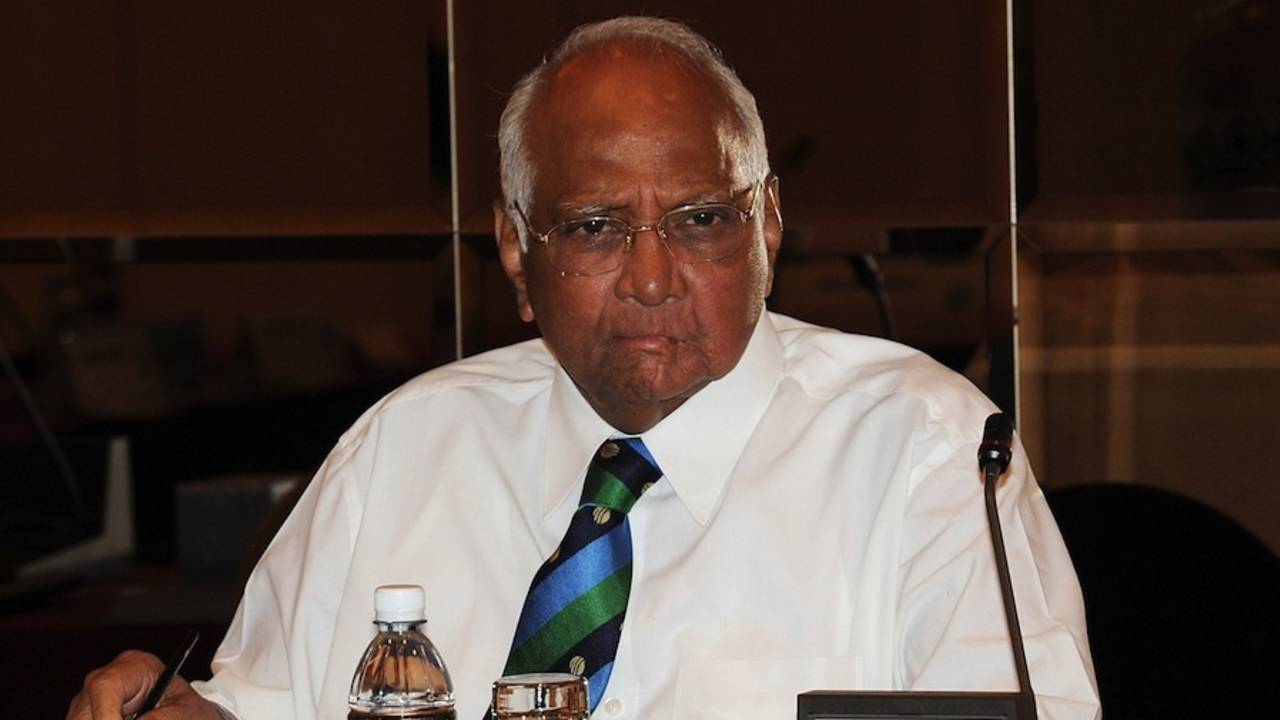Sharad Pawar resigns as MCA president
PV Shetty, the MCA joint-secretary, confirmed the receipt of the letter but said the MCA was yet to take a call on the matter
Arun Venugopal
Dec 17, 2016, 1:07 PM
Sharad Pawar has held key roles with BCCI and ICC • Getty Images
Mumbai Cricket Association president Sharad Pawar is the first high-profile Indian cricket administrator to step down in the wake of the Lodha Committee's recommendations that made him ineligible to continue in the post. The MCA, however, said it had not yet accepted Pawar's resignation.
The Lodha Committee, among other things, had recommended that BCCI and association office bearers should not be over the age of 70, should not hold office for more than nine years and should not be ministers or civil servants. Pawar, 76, has been MCA president since 2001 and is a politician.
The BCCI and a majority of the state associations had rejected adopting these specific recommendations from the Lodha Committee despite the Supreme Court having approved them in it's July 18 order.
Pawar resigned his post at an MCA committee meeting in Mumbai on Saturday. "He has submitted his resignation to me, honouring the Supreme Court judgment," MCA joint-secretary PV Shetty told ESPNcricinfo. "We have taken his resignation letter, but we have not accepted it or acted on that till the next meeting."
MCA joint-secretary Unmesh Khanvilkar said Pawar's resignation was the only point of discussion in the meeting that lasted for half an hour. "We will decide on the date of the managing committee meeting in the next week and have a discussion on it [Pawar's resignation]," he said.
In his letter to the MCA, Pawar said that he was "hurt" by the Supreme Court's observation that BCCI officials did not want to give up "lucrative" positions in the board. "While taking the decision regarding cricket, the Supreme Court has said that the officials should not be above 70 years of age and they have described these positions as 'lucrative' which made me very sad and that's why I don't have any wish to work any more," the Indian Express quoted him as having stated in his resignation letter.
"In reality the positions are filled through democratic means. Since these appointments were happening through democratic means, I was happy to work in that position.
"During my term as MCA president, I did not take any allowance or get any financial benefit. I and my colleagues have given time and taken the entire responsibility for our work in the association. While building new facilities, we took care that the name of MCA will be taken with pride. The Supreme Court should have taken a note of this."
A powerful regional politician, Pawar, while continuing in his role as MCA president, took over as the BCCI president in 2005, before taking up the same role in the ICC in 2010. He had announced after a meeting of the managing committee in July he would step down as MCA president within six months, and that the Lodha Committee's recommendations would be implemented within the stipulated six months. He said the association would begin the process of reform by amending its constitution.
"As per the Supreme Court guidelines, I can continue [as MCA president] for six months, not beyond that. After that khushi se alvida [I will happily bid goodbye]," Pawar had said then. "I am quite happy to retire because Supreme Court has said nobody above 70 can continue. Secondly, Supreme Court has said about [the maximum period of] nine years, so I come in both categories, and therefore I should not expect to continue."
Pawar, though, said, the MCA wanted clarification on the one-state-one-vote proposal, by which no state can have more than a single vote in the BCCI elections. Currently Maharashtra contains three associations eligible to vote, the Maharashtra Cricket Association, the Mumbai Cricket Association and the Vidarbha Cricket Association. The Lodha Committee recommended that in such cases, the associations vote by rotation; so each of Maharashtra, Mumbai and Vidarbha will get a vote once in three years.
According to the Indian Express, the MCA eventually convened an SGM in November to discuss the recommendation and arrived at a consensus that the specific recommendation had the potential to "affect their very existence."
Arun Venugopal is a correspondent at ESPNcricinfo. @scarletrun
